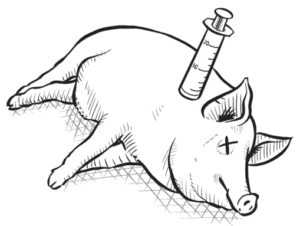Looming food shortage

Widespread food shortage is becoming imminent in the National Capital Region (NCR) and across the country. Many farmers and businessmen incurred high income losses because of Duterte’s militarist and restrictive lockdown. Many were forced to stop production. The situation is bound to get worse with Duterte’s plan to extend the lockdown until April 30.
Agricultural supply became increasingly scarce due to the lockdown. Contrary to the regime’s order to allow the transportation of food products and cargo, trucks that carry food and meat products are hampered at checkpoints.
These past few weeks, tons of vegetables were left to rot, dumped or fed to animals as farmers were unable to sell their produce. Many farmers were compelled to sell their products at extremely low rates. Pechay farmers for instance, sold their produce at P3/kilo, way below the P60/kilo suggested retail price (SRP).
Farmers from Benguet and Mountain Province, provinces which primarily supply Metro Manila with vegetables, incurred highest losses. They have long been suffering from low farmgate price. Now, majority of traders stopped buying their produce as they could not transport these into markets. Despite efforts of some local governments to buy their produce, a large portion of their harvests were not sold.
Poultry farmers in Central Luzon and Calabarzon, regions that supply almost half of the total supply of chicken meat and eggs across the country, are also unable to sell their produce due to the lockdown. This has sparked a poultry glut in the region which further pulled down farmgate prices.
According poultry farmers, the farmgate price of chicken dropped to P30-P50/kilo which is lower than their P70/kilo cost of production. Ironically, the market price of chicken in Metro Manila increased due to limited supply. Recent reports indicate that the average price of chicken in Metro Manila has reached P160/kilo, higher by P30 than the P130/kilo SRP. They are also unable to sell chicken eggs which are also just left to rot.
On top of these, more than 800 container vans containing perishable goods such as vegetables, fruits, meat and medical supplies are stuck at ports in Manila.
Meanwhile, multinational companies in export-processing zones threatened to move their operations to other countries if they will not still be allowed to re-open and operate. They challenged the regime to allow limited operation of their factories. However, they have not offered any comprehensive compensation program or safety measures for their workers. Their operations, which are primarily concentrated in enclaves, were put to a stop due to the lockdown.

